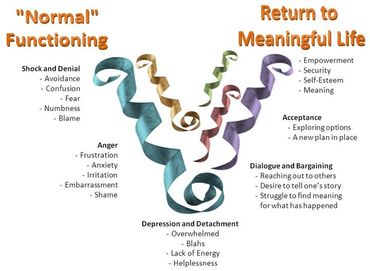 This blog entry is in response to the individuals who lost their life in the shooting at Pulse night club. I give my genuine condolences and sincere thoughts and prayers to the soles in the club and their families. Recently I have been calling in to the radio station, 96.5 WDBO and commenting under the name of "Mark the therapist" in an attempt to offer help and guidance. Many, if not all will be adversely affected by this tragedy and will go through the grief process. A basic understanding of the stages of grief along with therapeutic suggestions (what to do) will be described in this entry. 5 Stages of Grief: There are 5 stages of grief that are denial, anger, bargaining, depression and acceptance. These emotions and thoughts are not experiences in any general order. It is completely normal to feel any one of these emotions at any time especially during the early stages of grief. The emotions associated with grief and loss is universal to all walks of life. Below is a brief description of each with basic examples. Denial: Denial is often one of the first emotions experienced during grief and the brains way of attempting to cope with the new reality of loss. This includes feelings of disbelief, trying to rationalize what happened, and often isolating from others. Sometimes one will feel that the deceased person will return or is still with us. This is also completely normal in the beginning stages of grief and the brain’s way of trying to cope. Bargaining: Similar to denial, this includes feelings of disbelief, trying to rationalize what happened, and often blocking the memories of the traumatic event. Thoughts like: “If only I had told my friend not to go”, “If had just called him a few minutes earlier.” Anger: Anger and depression are one in the same – just in different forms. The anger towards the shooter is inevitable. Because we cannot directly communicate with shooter, we experience anger towards others, frustration and confusion. Many people experience an increase in anger at work, while driving or with loved ones. Depression: Depression is often repressed anger. Depression also includes the feeling of pure loss and trying to accept that we will never see the person again. This feelings such as a pit in the stomach, thoughts of remorse, regret and sometimes guilt. If you find that you or your loved ones start to isolate from others for more than a few hours at time, consider seeking help. Acceptance: This is the stage when our brain starts to cope and understand what has happened. We continue to feel the stages of grief, but to a much lesser affect. The experience of loss never completely goes away, it just becomes more manageable. How long does it take to feel better? – Everyone is different and there is no universal answer. Generally the outcome depends on what you do after the loss and you coping skills. Try to engage with others, share your emotions and thoughts with them. Your brain will be able to make sense of what happened sooner that it would if you isolated yourself. Usually, the brain takes about 30 days to make new neural connections and “feel different”. The first few days to two weeks are the hardest although many begin to start feeling a little better after about a week. Is it normal if I just start crying out of no where? Absolutely – Yes. Emotions and pain build up inside us and we cannot always control when our brain decides to purge our emotions. Crying is necessary and don’t fight it. What else can I do to help myself grieve? Create your own positive meaning of the lives lost. Remember the people who lost their lives in appositive way and the positive impact their loss had on the community. Reframe the loss in a way that brings a positive view of what happened. Take a break from the grieving. It’s ok to watch a movie and escape for a few hours. Your grief will be there when you return to it. The brain needs a break from the grief to heal just like your muscles need to rest. When should I seek counseling? When you feel overwhelmed and notice an excess of anger, anxiety and depression. You may notice you have difficulty sleeping or feel anxious almost all the time. If this happens more than a few weeks, seek counseling. Remember, you don’t deserve to feel bad and it is your right as a human being to feel good. Who do I see for help? For talk therapy without medications, you would seek a licensed mental health counselor. The letters after the clinician’s name would look like this: LMHC, LPC, PSYD, LCSW. Contact your insurance company or look a for therapist who accepts self pay. I also offer online therapy via Skype, self pay only. Disclaimer: This is blog entry is not for the purpose of diagnosis or treatment of a medical condition. Please consult your physician if you experience a more serious condition or symptoms. |
Archives
April 2020
Mark ZaussTrumpet player, Licensed clinical psychotherapist. Categories
All
|